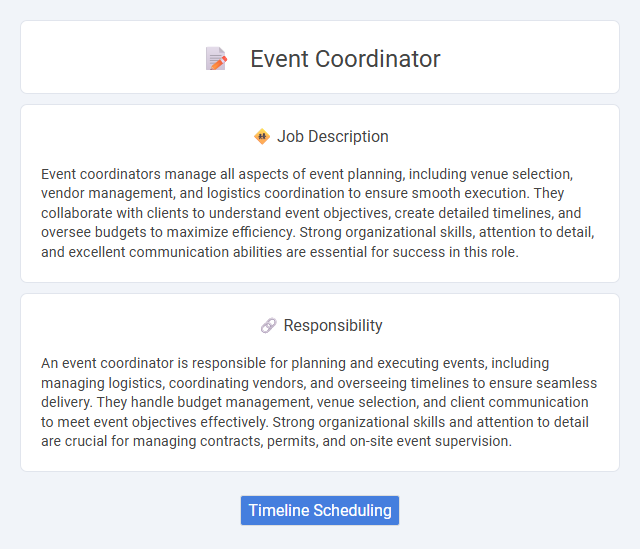
Event coordinators manage all aspects of event planning, including venue selection, vendor management, and logistics coordination to ensure smooth execution. They collaborate with clients to understand event objectives, create detailed timelines, and oversee budgets to maximize efficiency. Strong organizational skills, attention to detail, and excellent communication abilities are essential for success in this role.
Individuals who thrive in fast-paced, dynamic environments with strong organizational skills are likely to be well-suited for an event coordinator role. Those who handle stress effectively and communicate clearly under pressure probably find success in managing multiple tasks simultaneously. People who prefer routine and low-stress jobs may struggle with the unpredictable nature of this position.
Qualification
Event coordinators require strong organizational skills, excellent communication abilities, and proficiency in project management software. A bachelor's degree in hospitality, marketing, or business administration is often preferred, with certifications like Certified Meeting Professional (CMP) enhancing credentials. Experience in multitasking, budgeting, vendor negotiation, and problem-solving is essential for successful event planning and execution.
Responsibility
An event coordinator is responsible for planning and executing events, including managing logistics, coordinating vendors, and overseeing timelines to ensure seamless delivery. They handle budget management, venue selection, and client communication to meet event objectives effectively. Strong organizational skills and attention to detail are crucial for managing contracts, permits, and on-site event supervision.
Benefit
Event coordinator jobs likely offer benefits such as enhancing organizational and multitasking skills through managing various aspects of events. There is a high probability of gaining valuable networking opportunities by collaborating with vendors, clients, and team members. The role may also provide a sense of accomplishment and creative satisfaction when successfully executing well-planned events.
Challenge
Event coordinator roles often involve managing multiple tasks simultaneously, which may create a challenging environment requiring strong organizational skills. The probability is high that unexpected issues will arise during events, demanding quick problem-solving and adaptability. Coordinators frequently face pressure to meet strict deadlines while ensuring client satisfaction and seamless execution.
Career Advancement
Event coordinators develop essential skills in project management, budgeting, and vendor negotiation, which create a strong foundation for career advancement into senior roles such as event manager or director of events. Gaining experience in diverse event types and expanding professional networks enhances opportunities for leadership positions within large organizations or specialized event planning firms. Continuous certification and mastering event technology further increase an event coordinator's marketability and potential for higher-level management roles.
Key Terms
Timeline Scheduling
Event coordinators excel at timeline scheduling by creating detailed plans that outline every phase of an event, ensuring seamless execution from setup to breakdown. They utilize project management tools and software to allocate time slots for vendors, speakers, and activities, preventing overlaps and delays. Precision in timeline scheduling enhances event flow, optimizes resource use, and improves attendee experience.
 kuljobs.com
kuljobs.com